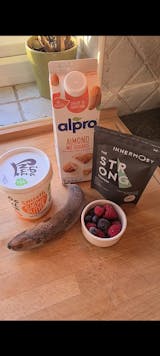Kathryn Pinkham is the founder of The Insomnia Clinic, the UK’s leading and largest insomnia service. Kathryn’s personalised approach and use of cognitive behavioural therapy (CBT) has helped people across the country transform their lives, so we sat down with her to ask her all our burning questions about sleep, and how we can get better at it.
Hey Kathryn! What made you start working with insomnia patients?
My background is in the NHS. I worked in mental health services for a few years and we did some training in insomnia and I absolutely loved it. What I saw is that anyone with a mental health problem almost always has a sleep problem too. If you’re depressed, anxious or stressed, you're probably sleeping badly. And if you aren’t sleeping well, it’s hard to feel well otherwise.
In 2013, I was made redundant from the NHS and that’s when I set up The Insomnia Clinic, working one-to-one with people with sleep problems and it’s expanded from there. In the last two years, I launched an online course because actually not everyone needs one-to-one therapy. It can be expensive and time-consuming, and it’s not necessary for everyone. Even though we’re now on Zoom it actually works quite well because it now means anyone anywhere can access our services.

So why do we sleep, and why is it important?
While we sleep we’re regenerating our cells, consolidating memories, and recovering from the day. Sleep is not a passive process. There's work being done. So it’s important for both physical and mental health to get good quality sleep.
Is there such thing as a 'normal' sleep cycle?
For me, the eight-hour thing is a bit of a myth. If you can’t sleep, hearing you should get eight hours is the worst possible thing because you're already stressed and already trying really hard. What I say is put quality sleep first. That means falling asleep within half an hour, sleeping until your alarm goes off, getting back to sleep if you do get up in the night, and staying awake during the day. That’s quality sleep. But you can’t out-sleep stress and that’s often the problem in the first place.
During lockdown, everyone’s been more stressed than usual and lots of us have been sleeping worse at some stage. Why is that?
The problem with lockdown and the reason it’s affected people so negatively is because people have stopped setting alarm clocks. They get up later, lose routine, and their body blocks lose that structure that kept them sleeping well. People also couldn’t do as much; it was more difficult to exercise and get out and get fresh air. And one of the biggest factors in insomnia is stress. Anxiety around the virus was high and that lends itself to lying wide awake in the middle of the night worrying about things.
The biggest thing that manages how well we sleep is our sleep drive. It’s like an appetite. When you wake up in the morning you start building a sleep drive until you go to bed again. So the longer you’re out of bed for, the stronger that drive is. But the more time you spend in bed, the lower that drive and appetite is. So a lot of the advice I’ve been giving to people while we haven’t been able to do much is go to bed later and get up earlier. Don’t worry about the eight-hour thing. You want to kickstart that drive again.
So what actually is insomnia?
Someone with insomnia is defined as anyone who has problems falling asleep, or if it takes you longer than half an hour to fall asleep repeatedly. It's also waking through the night and not being able to get back to sleep, feeling unrefreshed in the daytime, extremely early wake ups, and sleep anxiety.
The way insomnia develops is you have a bad night for some reason or another, and we’re very intolerant to not sleeping well. So we panic and try really hard to sleep well, and it actually interrupts our sleep drive because we try lots of things like going to bed early. But this is one of the worst things we can do because the body clock loses its structure. The more time you spend in bed stressing over not sleeping, the more you maintain that negative cycle.
We also try things like downloading apps or trackers, buying new pillowcases or getting special blinds. But this stuff - called ‘sleep hygiene’ - creates this vigilance around sleep and perpetuates the cycle. It doesn’t matter what triggers the insomnia, it’s what’s maintaining it. And often the things we try end up making it worse.
What causes insomnia?
One of the biggest factors is stress. But generally, insomnia develops when you’re missing some or all of three key things that you need for good quality sleep.
The first is sleep drive, the second is our body clock needs to understand what to do, and the third is a connection with our bed about sleep. If you spend a lot of time in bed or in your bedroom while feeling stressed, your connection with your bed becomes about stress and so you’ll feel stressed when you get into bed.
So how do you help your patients?
The first step is always education. You need to make people aware that sleep is fairly simple, and that spending too much time in bed lying awake is actually making it worse. Good sleepers always have a high sleep drive, their body clock knows what to do, and they have a positive association with their bed. They have those things in place. We don’t need all the other stuff.
We then start from the basics. The treatment programme I offer is called cognitive behavioural therapy (CBT) for insomnia, which is the NHS-recommended treatment and it's generally a 4-week programme. Most people see results in less than that time. It tackles the behaviours we have around sleep. So looking at increasing that sleep drive, and managing physical and internal parts of the problem. But we also look at someone’s thoughts and beliefs around sleep and try to make those more positive. Insomniacs usually have very negative thoughts about sleep and their ability to cope. It’s not enough to just work on anxiety, thoughts, and relaxation. You have to also deal with the physical part of it too.
Have people’s new working environments and lifestyles impacted their sleep?
Yes. For example, lots of people have been drinking more alcohol than normal. The rules were thrown out the window a bit. But I never tell people you shouldn’t drink at all and don’t drink caffeine, because that’s not real life. Good sleepers do do those things. Obviously don’t go to bed having drunk excessive alcohol regularly, but having a drink every now and then to relax is absolutely fine. It’s all about balance. We just need to start bringing some of these boundaries back in. For example, setting your alarm and making sure you get up when it goes off, staying out of your bedroom as much as possible, making sure you have a firm end time to your working day, and separating your workspace from your relaxing space.
And why do people say excessive screen time before bed is bad?
So there’s two things. Firstly, blue light inhibits melatonin. That’s the sleep hormone and without it, you can’t sleep. It’s suppressed during the day by daylight, which is why we aren’t sleepy in the day. When it then gets dark, we start to develop it again and it’s the body’s sign that it’s time for us to go to sleep. And blue light mimics daylight, so if you spend too much time in front of a screen at night you might struggle to develop enough melatonin.
The second part is that if you’re working or thinking by checking emails, you’re signalling to your brain that you still need to be active. You can use your phone before you go to sleep, but constant scrolling isn’t a good idea.
What about sleep trackers? Do they work?
For me, there’s no point. People obsessively track their sleep and decide how they feel based on the results. People will cancel meetings, stop socialising and go about their day with a negative mindset because of what they’ve read on their phone. I don’t think they’re accurate enough and they give the same old advice that won’t actually fix an insomnia problem.
How does nutrition play into our sleep health?
As long as you have a normal healthy diet, you’ll have everything you need to sleep well. If you look at ‘good sleepers’, they don’t have a different diet to everyone else.
And finally, what are your top practical tips that anyone can try to get a better night’s sleep?
- Spend less time in bed and make sure you’re properly tired when you do go to bed.
- If you’re lying awake in the night, don’t stay in bed as you’ll connect your bed to anxious feelings. Watch TV or read a book for a little bit until you feel tired. Don’t set your alarm back later either. Get up when you had planned to.
- Each day, get into the habit of setting aside 20 minutes to write down what’s on your mind. If you can’t fill 20 minutes with your worries, then you know you shouldn’t be worrying around the clock 24 hours a day. The aim isn’t necessarily to find solutions, it’s to acknowledge your worries and do so at a suitable time instead of in bed.
- Don’t watch the clock. If you wake up in the night and check the time, you’re teaching your body to do it and it creates anxiety. Until your alarm goes off in the morning you don’t need to know the time. There’s nothing to be gained by it.
To find out more from Kathryn, you can follow her on Instagram (@theinsomniaclinic) and find her at The Insomnia Clinic.
























